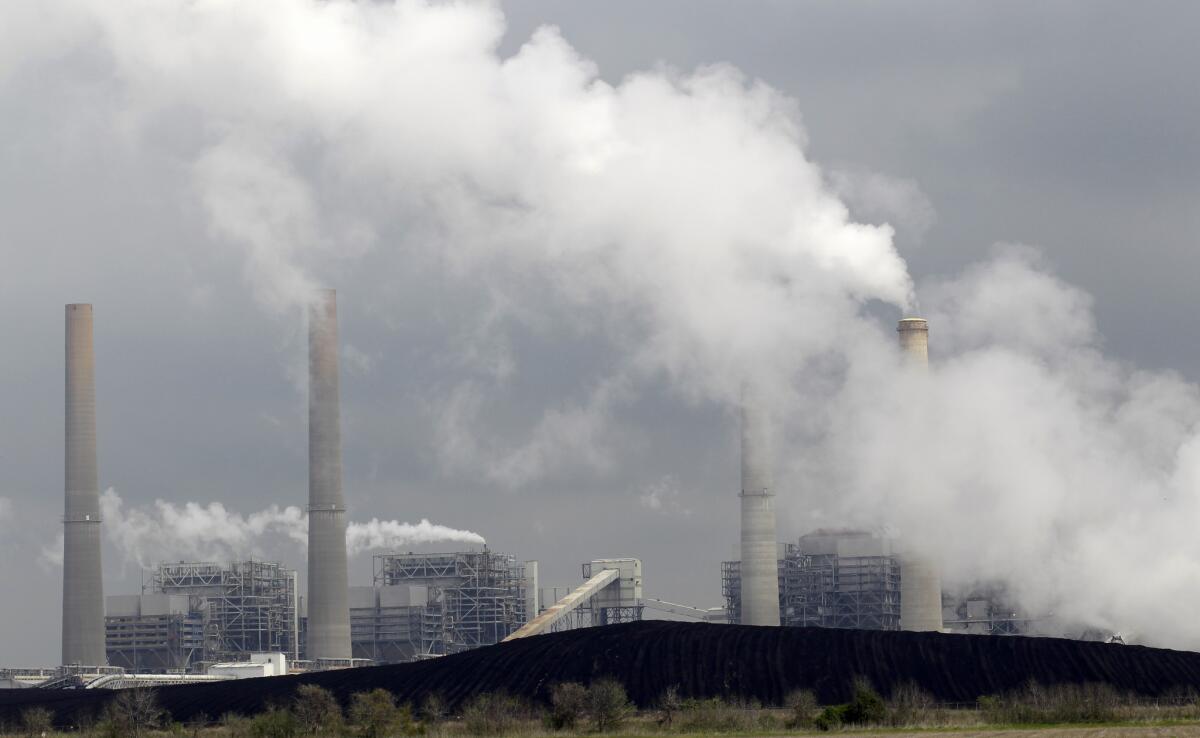Op-Ed: Bill McKibben: Being carbon-foolish cost CalPERS and CalSTRS $5 billion

Exhaust rises from smokestacks in front of piles of coal in Thompsons, Texas.
First they ignore you, then they laugh at you, and then they lose a truckload of money.
For three years now, a fossil fuel divestment campaign has been gaining traction around the world. Those that have begun selling their fossil fuel holdings include France’s largest insurance company, Oxford University and the nearly $900-billion Norwegian sovereign wealth fund. Many California institutions have joined in, including Stanford University, Pitzer College, San Francisco State University, De Anza Community College — even the Santa Clara Valley Water District, which serves Silicon Valley.
But the really big money in California — the pension funds CalPERS and CalSTRS — have stayed on the sidelines.
The California Public Employees’ Retirement System and the California State Teachers’ Retirement System styled themselves savvy investors that didn’t want to make decisions based on mere morality, spurning the argument that it was time to stop investing in companies searching for yet more hydrocarbons. Instead, the funds promised to “engage” with those companies to change them.
How has that strategy worked so far? On Monday, the federal government gave Royal Dutch Shell the final permits it needs to drill in the Arctic for the first time in 20 years. And a new report shows that those savvy investors managed to lose their clients — the state’s pensioners — $5 billion in its oil and gas portfolios last year.
We at 350.org commissioned the analysis because we had an inkling of what it would show: Had CalPERS and CalSTRS listened to the scientists and the college kids, retired cops and teachers who sought divestment and gotten out of coal before it collapsed, they would have avoided those shocking losses.
As the head of Trillium Asset Management, which performed the analysis, said, “This is a material loss of money, which directly impacts the strength of the pension fund.”
This loss won’t bankrupt the pension funds, which still gained overall because the rest of the market went up so sharply. But even for a rich state, $5 billion is real money.
The divestment campaign began early this decade when British financial analysts published data showing that the fossil fuel industry had as much as five times as much carbon in its reserves as scientists said the planet could burn if it had any hope of staying below a 2-degree Celsius rise in global temperature — the one red line that governments, including our own, have drawn in decades of international climate negotiations. The math makes it clear that if Exxon and Chevron and their ilk follow their business plans, the planet tanks.
A morally minded investor, looking at those numbers, might say, “If it’s wrong to wreck the planet, it’s wrong to profit from the wreckage.” Accordingly, the United Church of Christ, the Episcopalians and the Unitarians have all begun divesting.
A harder-headed investor might say, “If I sell, someone else will buy the stock, so who cares?” The answer, campaigners have stressed, is that selling stock exerts both political and indirect financial pressure on these companies.
And in fact the World Bank, the Bank of England, Deutsche Bank and others have warned about a “carbon bubble.” Even Peabody Energy Corp., the world’s largest private sector coal company, in its last annual report, told investors that divestment campaigns “may adversely affect the demand for and price of securities issued by us, and impact our access to the capital and financial markets.” (The corporation’s stock, by the way, which sold at $72 four years ago, closed Monday at $1.18.)
A practical investor might say, “These scientists are bringing me new information, knowledge that isn’t yet fully priced into these investments. If we can’t safely burn all that coal and oil and gas, perhaps we won’t burn it. Maybe world leaders will start to restrict the use of carbon.” And, indeed, they have begun to do so in the run-up to this year’s big Paris climate conference.
So far, it’s the divestment-minded investors that have come out on top financially. In fact, over the last five years, fossil-free index funds have outperformed the broader market by 1.2%.
It’s too late for California’s funds to avoid taking at least a little bath. But state Senate President Pro Tem Kevin de Léon’s SB 185 — part of a larger climate change package — would divest the state from coal stocks and at least get California on the right track.
And the bill’s proponents have been reasonable, asking only that the two pension funds announce their intention to divest from fossil fuels and then take five years to sell their holdings. No one wants them to hold a fire sale in a market trough.
We need our biggest, richest institutions to play their part — if not just to be ethical, then because they’re committed to protecting their clients’ assets.
Bill McKibben is the founder of the global climate campaign 350.org and a professor of environmental studies at Middlebury College.
Follow the Opinion section on Twitter @latimesopinion and Facebook
More to Read
A cure for the common opinion
Get thought-provoking perspectives with our weekly newsletter.
You may occasionally receive promotional content from the Los Angeles Times.










